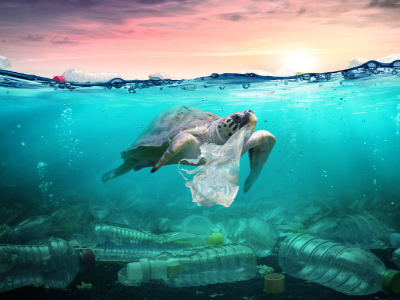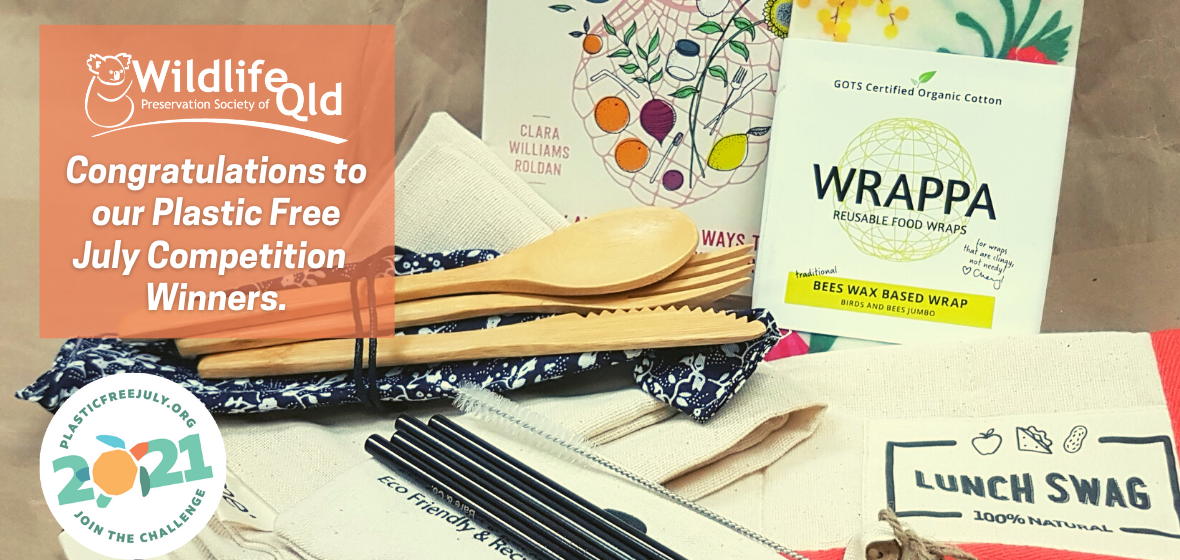Thanks to all of the inspirational entrants to our Plastic Free July competition. #PlasticFreeJuly is a wonderful catalyst for getting people to consider waste-reduction strategies in their own homes, but let’s not stop there … we need to be #plasticfreeeveryday.
Reducing plastic waste year-round
From 1 September 2021, single-use plastics including straws, spoons, stirrers and cutlery will be phased out in Queensland as part of the Waste Reduction and Recycling (Plastic Items) Amendment Bill. Wildlife Queensland actively advocated for this change to help reduce the environmental impact of plastics on our vulnerable ecosystems and wildlife.
Reducing plastic waste makes for a cleaner, less-polluted planet, and with the ban on single-use plastics soon taking effect, it pays to make a start.
If you’re ready to ‘pack it in’ for plastic, but you’re not sure where to start, below are some ideas from the winners of our competition.
All of our winners will be contacted and receive our plastic-free gift pack valued at $95.
This year’s plastic free July has been challenging for me. Usually, I use bulk foods, use leaf tea, make my own yoghurt from powdered milk, have reusable shopping bags, shop at op shops, mend my clothes, and volunteer at repair cafes. This year, I’m 1200km from home, providing Covid19 vaccinations in regional Queensland … the additional reduction of plastic this July is difficult in a clinical sense, but we try!! Belinda
Editor’s comment: We can certainly see how that would be a challenge. Even the most well-meaning people can find themselves falling off the plastic-free wagon when they’re away from home and more reliant on fast food or packaged goods. Unfortunately, during these difficult times, medical waste is also increasing. We all need to be mindful of how we dispose of masks and plastic wrappers. Good on you, Belinda, for continuing to make an effort while you’re providing a valuable service to remote Queenslanders. We admire your dedication.
I use glass containers, eco food wraps, and always take cutlery with me if I’m going to get takeaway. I say no to plastic straws. I mostly buy products with eco packaging where I can. I don’t put my fruit and veg in supermarket plastic bags. I have a lot of reusable household things like water bottles, etc. I even recycle some plastic things for holding my plants! Eden
Editor’s comment: These are all great ways to reduce your plastic usage, Eden. We love to see takeaway places offer price reductions to those who bring their own containers, and we are glad plastic straws are being phased out with single-use plastics from 1 September. They’re simply unnecessary.
I have recently been trying to change my Toiletries to be plastic free. So far, I have changed from using bottled soaps, shampoos and conditioners to now using bars that come in plastic free packaging. I now only use wooden toothbrushes. I have switched sanitary products to a reusable alternative. I have switched to a deodorant cream rather than an aluminium aerosol. I am looking at doing my kitchen next, and I believe this prize would give me a great head start. Amelia
Editor’s comment: Yes, those shampoo and conditioner bottles, and toothbrushes, really add up over time. Making a start on a single room of the house is a sensible and affordable way to gradually reduce your plastic use. Good luck with your kitchen conversion, Amelia. We’re sure you’ll love these products.
In 2020 I organised a weekly Plastic Free July email to my colleagues with content based on raising awareness on plastic usage and our broader environmental footprint. I focussed on four weekly email themes of behavioural change, trees, community connection and taking action. We also did a craft activity via Teams making tote bags out of T-shirts. This year (2021), I am organising the same weekly emails and have brought the HR team on board! I have organised a horticulturalist to speak, and we will be making microgreen trays using egg cartons over Teams!
The response from the weekly emails has been great, and I have forged stronger connections with my team across QLD and NSW through Plastic Free July. Plastic usage was reduced in the office, recycling of products improved and we are now starting to compost/worm farm our food! Alana
Editor’s comment: Who doesn’t love some egg carton craft? It is wonderful to see businesses and corporations becoming more involved in composting and reducing waste. Most people spend a lot of time in the office, so waste reduction can make a real impact there. It also encourages staff to implement those tips at home, reducing personal plastic waste too. Great work, Alana.
I’m trying hard to reduce single use plastic in my life. I have purchased reusable drawstring bags for my fruit and vegetables which I buy from the local grocer. Reusable containers are used to store leftovers and cut food. I am buying dry foods from The Source using my own glass recycled containers. I have a keep cup for coffee purchases. I am careful about the fabrics used in making the clothes I wear and try to stay aware of the way those fabrics are sourced and made. I’m not perfect. Occasionally I will buy take away and try where possible to wash and reuse containers. I also wash and reuse ziplock bags if they haven’t been used for meat storage. I have had bees wax wraps before but they have aged and I’m due for new ones. I’d love to win the prize! Nicky
Editor’s comment: Sorry to hear your beeswax wraps are getting a bit tatty, Nicky. Sounds like you’re doing a fantastic job of keeping on top of your plastic usage. We don’t expect perfection because we know that even little changes add together over time. We love that you’re doing your bit.
Remember, there is no ‘away’…

Every bit of plastic waste you reduce helps marine life.
Image: Romolo Tavani, Getty Images/Canva NFP
Any plastic you ‘chuck away’ in your general waste bin ends up in landfill, taking centuries to decompose—if it ever fully does. Most continues to break down into smaller and smaller ‘microplastic’ particles that accumulate in the environment.
A CSIRO report found that ‘three-quarters of the marine debris found along our coastline is plastic, most from local sources.’
Focusing on household waste reduction as a daily task means less stress on our planet and helps conserve valuable resources. It also saves wildlife by preventing deaths from plastic consumption or the accumulation of microplastics.
So, here are a few more easy ways you can continue to help all year:
- Ramp up reusables: Wildlife Queenslands’ shop sells affordable reusable products such as bamboo cutlery, mesh produce bags and reusable stainless steel straws. All proceeds help us protect and conserve Queensland’s native wildlife.
Shop reusables ➡️ - Compot it. All your kitchen and animal waste can be turned into compost with a composting solution called the Compot. You’ll help save the environment, reduce council waste and support wildlife because 10% of each sale goes to WPSQ.
Shop the Compot ➡️ - Cash in your containers: Containers for Change allows you to make money while helping your environment just by taking eligible drink containers to a collection point. You can also donate your refund to Wildlife Queensland projects by quoting our scheme ID number: C10002920. Find out more ➡️

